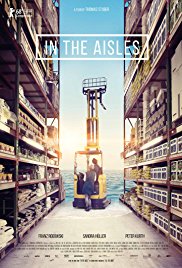
IN DEN GANGEN/ IN THE AISLES
Germany, 2018, 125 minutes, Colour.
Franz Rogowski, Sandra Huller, Peter Kurth, Andreas Leopold.
Directed by Thomas Stuber.
This film has a delightfully playful opening. Tchaikovsky’s Waltz of the Flowers comes up immediately. And the visuals are of corridors in a supermarket warehouse with forklifts going up and down the corridors, crossing the corridors, all in the rhythms of the Tchaikovsky waltz, forklifts as flowers! Later the music will go to Bach and to Strauss and then to more modern songs, especially with the setting of Christmas.
This is a film which offers more than you ever thought you would need to know about forklifts! And, at the end of the film, one might be tempted to think: somebody made a bet with the director and writer of the film that he couldn’t make a film of over two hours, no explicit sex and violence, mostly set in the supermarket and the warehouse. But he has.
In the Aisles won the Ecumenical Award at the 2018 Berlin Film Festival. The criteria for this award Included a dramatisation of basic human values. And this is certainly a film of humanity, human values.
The film focuses on Christian (emerging star Franz Rogowski, who appeared as Isabelle Huppert’s son in Happy End and as the hero in Transit) a rather reticent and shy young men who applies for a job in the supermarket. The manager treats him sympathetically and sends him down the corridors to Bruno who is the manager of forklift staff. Christian is rather awkward in personal manner as well is in driving forklifts at first but we know that he will ultimately succeed.
One of the qualities of the film is showing the camaraderie amongst the workers in the supermarket. There is a room for the coffee break and Christian is immediately attracted by Marion, played by Sandra Huller who was seen effectively as the daughter in Toni Erdmann. Christian tentatively talks with her and she is encouraging. However, we later learn that she is married to a rather violent husband and has to take time off work. But Christian continues devoted.
Christian also makes friends with Bruno over the time. Bruno lives alone, used to be a truck driver, enjoys his work in the supermarket but wants more. He plays chess with the manager of the supermarket. The group will take time off at Christmas for a drink and get together with some playful mockery of various members of the staff. Bruno even invites Christian to his home for a visit and a drink. But there is a sadness about Bruno.
As has been mentioned, the audience sees more about forklifts, the way they are driven, the height of the lifts, the working of the gears, the shifting of goods from one part of the warehouse to another, more than we might ever have expected – but it may make us sympathetic to workers in larger warehouses whose work we never think about in any detail!
Christian is accosted at one stage by his past friends and we learn that he was something of a juvenile delinquent, spent time in an institution, but was young and this has not been held against him. Despite his awkwardness and shyness, and our seeing him alone at home, he does have prospects for a future.
Ordinary people, ordinary lives, ordinary work, ordinary situations – all presented quite engagingly and with a deep sense of humanity.
1. The title? The supermarket? The store and the warehouse?
2. A film of humanity, ordinary people, ordinary work, ordinary situations?
3. East Germany, the city, apartments, houses, the countryside, bars? The musical score?
4. A film of interiors, the stock rooms, the market, the aisles?
5. The playful opening with the Walls of the flowers and the forklifts moving like the flowers? The transition to bark, Strauss, Christmastime and the popular songs, coming down to earth?
6. The focus on the forklifts, then movement, size, height, the stores, the stacks, moving them? The number of forklifts?
7. The store, the stock, the various divisions, the various heads of departments? Sharing the work, the range of people, the coffee room at the breaks, talk and chatter, the night shifts?
8. Christian and his story, his age, shy, quiet at the store, not talking much? Going to apply, the meeting with Rudy, the interview? Introduction to Bruno, the test? Rudy and Bruno and their chess games? Their lives in the store? Christian and the test, not driving well? Bruno and his allowances? The training sessions, the classes, the tests? Issuing of licenses? Christian, living alone, at home, the tatters all over him, and by his friend? Eating at home, going to work, his life at work? His future?
9. The later information about his past, young, thefts, with the group, seeing in them at the bar, playing pool, watching? His being in juvenile detention? Not having a record?
10. The attraction to Marion, at the coffee, talking, her looking after the sweets area, sharing? Christmas of the bond, her comments? The truth about her husband, his harshness? Are being away, ill, her husband’s treatment? Christian going to the house, bringing the flowers, her being in the bath, getting out? Meeting her later, the return, the bond? Going to Bruno’s funeral? The sharing at the end?
11. Christian and his change, at home, at work, expertise with the forklift, helping Bruno, Bruno as a father-figure? Going to Bruno’s home, Bruno and the story about the truck driving? The visit, Bruno hanging himself? The pathos of the funeral? His bond with Rudy?
12. Question as successor to Bruno, getting the news, Rudy and his sadness? The promotion? Christian and his skills?
13. The other members of the team, the women, the men, the Christmas episode – and Clouse sunbaking, the jokes?
14. A film of humanity and hope?